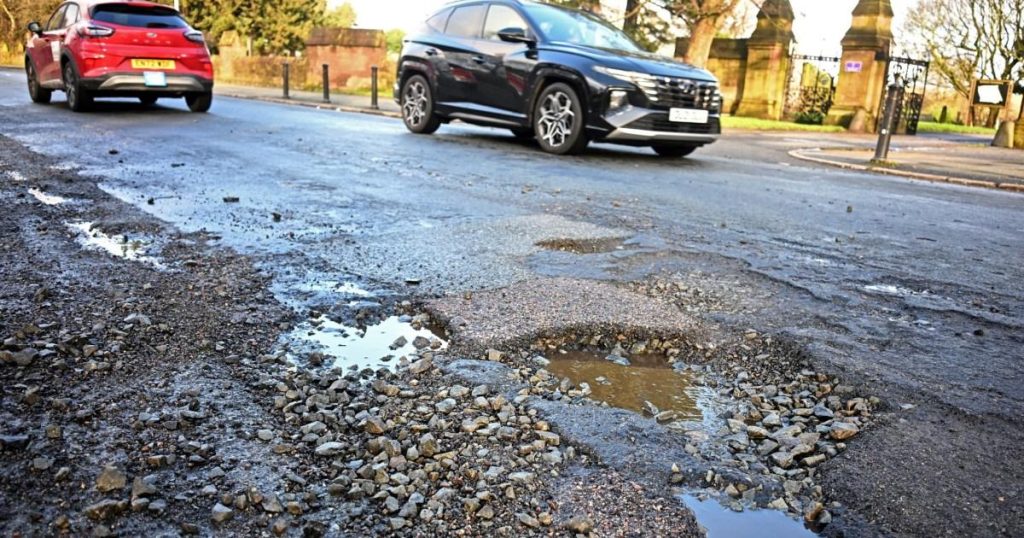The UK’s road network is plagued by potholes, costing drivers a record-breaking £579 million in repairs in the past year alone. This represents a significant increase from previous years, driven by a combination of inflation, increasingly complex vehicle technology, and a shortage of spare parts. While the number of pothole-related incidents reported by the AA has slightly decreased from its peak in 2018, the financial burden on motorists continues to escalate, with the average repair bill rising to £300. The impact of potholes extends beyond mere financial inconvenience, posing significant safety risks, particularly for vulnerable road users like cyclists and motorcyclists. The severity of the issue has prompted the designation of a National Pothole Day to raise awareness and advocate for improved road maintenance.
The escalating cost of pothole damage is not solely borne by drivers. The overall cost to bring all pothole-damaged roads in England and Wales up to standard is estimated to be a staggering £16.3 billion, a significant burden on taxpayers. This financial strain is compounded by the cyclical nature of pothole formation, with temporary repairs often failing to withstand harsh weather and heavy traffic, leading to recurring damage and further expense. The situation is exacerbated by periods of severe weather, such as the icy conditions experienced recently, which trigger a surge in pothole-related incidents and subsequent repair demands. Organizations like the RAC have reported significant increases in callouts following such weather events, highlighting the vulnerability of the road network and the urgent need for long-term solutions.
The impact of potholes is not just financial; it also presents a serious safety concern. Potholes can cause significant damage to vehicles, affecting shock absorbers, suspension springs, and wheels. More alarmingly, they can lead to fatal accidents involving cyclists and motorcyclists. Between 2017 and 2021, six cyclists lost their lives and 112 suffered serious injuries due to defective road surfaces in the UK. High-profile incidents, such as the multiple vehicle damage caused by a single large pothole on the M25, further underscore the potential dangers and the disruption these road defects can cause. The growing concern surrounding pothole safety has prompted increased calls for proactive measures to address the underlying causes and prevent future incidents.
In response to the growing pothole crisis, various initiatives are underway to address the issue. The Pothole Partnership, a collaborative effort between the AA, British Cycling, JCB, and the National Motorcyclists Council, aims to promote long-term solutions and advocate for increased government investment in road maintenance. The government has allocated almost £1.6 billion to local authorities for road maintenance, a substantial increase compared to the previous year. This funding is intended to support proactive repairs and preventative measures to address the root causes of pothole formation. While these initiatives offer a glimmer of hope, the scale of the problem requires sustained effort and long-term commitment to ensure lasting improvements.
While the increased government funding and the formation of partnerships represent positive steps, significant challenges remain. Ensuring that allocated funds are used effectively and efficiently is crucial. The government has emphasized the importance of proactive maintenance to prevent potholes from forming in the first place, rather than relying on reactive, often temporary, repairs. This shift towards preventative maintenance requires careful planning, effective resource allocation, and a commitment to long-term infrastructure improvement. The success of these initiatives will depend on the collaboration between government bodies, local authorities, and industry partners to implement sustainable solutions.
The UK’s pothole problem is a multifaceted challenge with significant financial and safety implications. While the increased government funding and collaborative initiatives like the Pothole Partnership offer hope, the scale of the problem demands sustained effort and long-term commitment to achieve lasting improvements. Shifting from reactive repairs to proactive maintenance is crucial for preventing future potholes and ensuring the safety of all road users. Effective implementation of these strategies, coupled with ongoing monitoring and evaluation, will be essential to address the root causes of the pothole plague and create a safer and more resilient road network for the future. Ultimately, the success of these efforts will depend on the collective responsibility of government, local authorities, and the public to prioritize road maintenance and invest in sustainable solutions.











